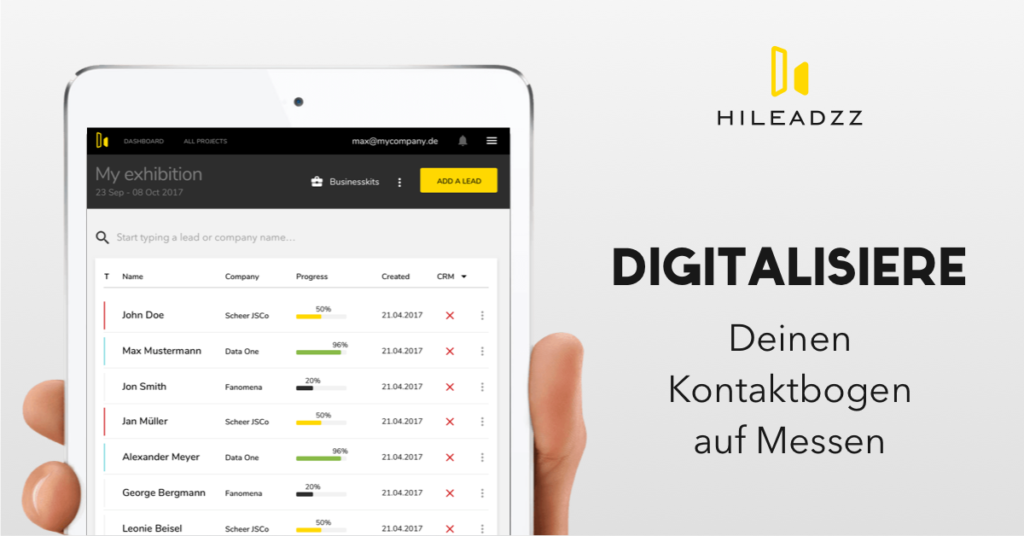According to a study by Capterea, 71% of the companies surveyed use manual methods such as e-mail programs, Excel spreadsheets, and Google Sheets or well-proven pen and paper to manage their customers instead of using a CRM.
The situation is very similar to lead management at trade fairs. While marketing ensures that everything runs smoothly, sales staff at the stand will be ready to record each individual contact on a sheet of paper using pen and paper.
Sounds familiar? For sure.
To your regret, the paper lead sheets amass on your desk and you wonder why they haven’t already bought a digital solution that makes manual typing into CRM obsolete.
At the end of the day, there is enough software on the market that allows you to scan business cards – why not use them?
Status Quo
71% of the companies surveyed use manual methods such as e-mail programs, Excel spreadsheets, and Google Sheets or well-proven pen and paper.
Capterea
But what’s the problem when so few companies rely on digital Lead Capturing?
Companies have long-established structures and processes.
According to the motto: “It is working, why should I change anything?
If you are engaged in the distribution of software or cloud software, you quickly notice that German companies are very skeptical about new software. It is not unusual to break up old processes and convince employees to use a solution.
This is the turning point–
Improvements for the lead management of the company are simply not realized, because decision makers are not ready for changes and see too much effort in the implementation.
Not without a reason, there is a whole new field of work for managers today.
The Change Manager, who is responsible for innovation and change in the company, will surely bend himself from pain when looking at paper lead sheets and recommend a digital capturing.
Bad experience with lead apps from the past
Another point is that companies have had bad experiences with poor business card scanners in the past.
What are the reasons for the companies’ negative expectations?
- Bad results and quality of data: Early solutions could not score with good results after a scan. This meant that data was often incorrect and had to be corrected.
- App unreliability: Some lead apps did not work due to a lack of Internet connection. Furthermore, they could not even be connected to common CRM/ERP systems, as there was no open interface until now.
But what if the quality of mobile solutions has improved significantly in recent years?
The software market has changed completely in recent years. With the entry into the “cloud” more and more providers have entered the software market and have stimulated competition.
The result
Solutions that are developed on the basis of customer requirements and therefore also work reliably.
Today’s digital capture solutions are elegantly integrated into your processes, sending automatic follow-ups to prospects and working hand in hand with your CRM.
You can find a great example in our Best Case, about the cooperation with Scheer GmbH.
What arguments can convince your boss that digital capturing is the right step?
I’m sure your boss has already thought about this step already. And that’s exactly why it’ gonna be easy for you to convince him.
Here are our 5 strongest arguments that will convince your boss:
1. Time advantage during and after the trade fair: Marketing and sales can fully concentrate on the important measures (customers, content, follow-up).
2. No more documents and lead sheets: Nowadays, every employee has a smartphone. Thus, data can be captured quickly and easily with the smartphone.
3. Problem-free integration into existing systems: A cloud software (“Saas”) can be easily connected to several CRM systems.
4. Higher data quality and elimination of data loss: Your annoyed trainee or student no longer has to enter data in the CRM. A good software takes over this process completely and contributes to higher quality in CRM.
5. Professional appearance at trade fairs through digital solutions: There will definitely be talk among competitors and customers that you are digitally positioned. In the age of digital transformation, a digital image, in particular, can only pay off positively for you.


